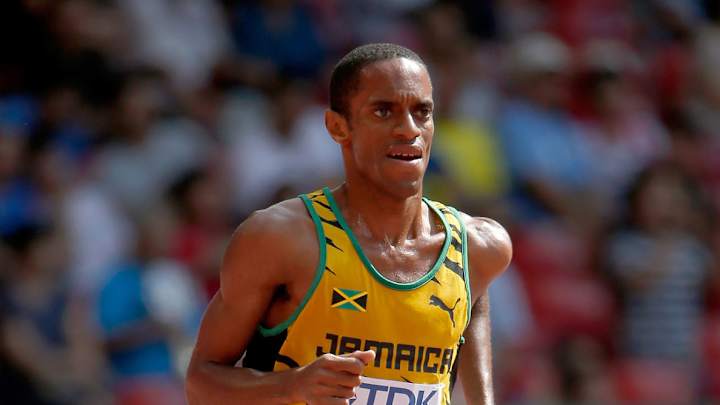Jamaican Distance Runner Kemoy Campbell Retires, Opens Up About Terrifying Collapse

Jamaican distance runner Kemoy Campbell announced his decision to retire from competitive running at 28 years old. The news comes just seven months after his heart stopped and he collapsed at the Millrose Games track meet in New York City.
“It’s with a heavy heart, or half of one rather. I must say goodbye to the sport. I will no longer be competing,” Campbell wrote on Instagram. “I have given my all to this sport. It has taken me to places I have never dreamt of going. It gave a shy boy from a rural area in Jamaica the opportunity to prove himself to the world. I believe I have done my part. I’ve represented myself, my family, my country proudly.”
On Saturday, Feb. 9th, Campbell collapsed shortly after stepping off the track while pacing during the men's 3,000 meters and was unconscious for a few minutes before he received attention from emergency responders. Defibrillators were used on him before he was taken off the track on a stretcher and transported across the street to the ICU at New York-Presbyterian/Columbia University Hospital. He was sedated and underwent testing before he woke up in stable condition on Monday. Doctors were unable to determine with certainty what caused his collapse but he was told that he possibly had a virus leading up to the race.
Campbell has no recollection of the fall.
“I remember warming up but it’s like the race never happened,” Campbell tells Sports Illustrated. “I woke up on Monday and saw (my fiancée) Rachel and I didn’t know where I was. That had never happened to me before. I asked her about the race that day and she told me it was Monday so I started to freak out a little bit.”
NBC televised the meet and showed Campbell’s collapse live. While the video made its rounds on social media, Campbell has yet to watch the video clip for himself and does not intend to.
“I’m sure it’s a very scary video,” Campbell says. “People who were there have told me how horrible it was. For me, it’s been a hard time adjusting. I’ve always seen myself as a healthy person. I could easily run 15 miles in a day like 10 in the morning and then five in the evening. I could come back the next day to do something similar. When something like this happens to you, you lose a part of you and you’re not that healthy person that you thought you were.”
Campbell spent three weeks in the New York City hospital before returning home to Charlottesville, Virginia. Much of the past seven months was focused on regaining his strength while also learning run and go upstairs as his mobility improved incrementally.
This summer, he rejoined his teammates on the Reebok Boston Track Club for a three-mile run. The training partners took off while he hung back at about a seven-minute per mile pace, which is lightwork for any professional runner (Campbell’s mile personal best is 4:00.98 and competed in the 5,000 meters at the 2016 Olympics). He felt fine but then started feeling chest pains when he returned home. He took the pain as a sign to slow down in his comeback efforts and consult with doctors about his condition.
Doctors in New York recently told him that despite his progress, there was a possibility that he may never run at a high level again. In hopes of good news, he decided to get a second opinion. On Thursday, doctors told him that if he went out and pushed his heart rate harder than 164 beats per minute, he runs the risk of another collapse and possibly death.
“That’s when I decided that I’m a young guy and I’ve got a lot of years ahead,” Campbell says. “I could coach if I want to. I can do many things to help the sport.”
Campbell plans to stay in Virginia to assist coach Chris Fox with the Reebok training group in any capacity. When he was in the hospital, Reebok president Matt O'Toole said Reebok would pay $50,000 to assist with medical expenses. Campbell’s collapse also prompted an open discussion on social media about professional runners and whether they receive health insurance from their sponsor.
If an opportunity presented itself for him to return to Jamaica someday, he has shifted his professional dream onto the next generation of distance runners in his homeland.
“One of my main goals now is to coach a Jamaican to medal at the Olympics,” Campbell says. “That was my goal. I was so focused on that. And now, I want to get someone to accomplish what I couldn’t. That would be the ultimate dream for me.”

An avid runner, Chris Chavez covers track and field, marathons and the Olympics for Sports Illustrated.